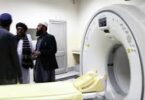KABUL (Pajhwok): Medical experts say controlling the spread of Covid-19 is impossible by closing only educational centers and there is need for closure of some other public places in Kabul and other major cities. Following a surge in Covid-19 cases, the Ministry of Public Health (MoPH) has announced closure of all educational institutes in 16 provinces, including Kabul, for two weeks.
In a statement, MoPH said the number of positive cases had recently increased, setting the alarm bells ringing in the country. In order to prevent the spread of the virus, the ministry said, all private and public universities, schools and other educational institutes would remain closed for two weeks with effect from Saturday.
Covid-19 not limited to educational centers only, entire Kabul should be quarantined: Dr. HashmatullahFaizi, a professional in Intensive Care Unit (ICU) in Afghan-Japan Hospital in Kabul told Pajhwok Afghan News that Covid-19 was not limited to educational centers only, but it threatened all houses, streets and markets. He said it has scientifically been proven that schoolchildren and university students had a stronger immunity.
“Quarantining only educational centers cannot cure any pain, the restrictions should be applied in the city, bazaars, ministries and other governmental institutions,” he said. He said that a large number of government workers and people walking in cities were elders and they were highly vulnerable to Covid-19 infection. Faizi criticized continued operation of some private educational centers and said that a number of private educational institutes were still open and the government should close them.
He said earlier when the graph of Covid-19 related cases was high, he suggested the Ministry of Public Health and the government to declare quarantine period for prevention of the virus spread, but no action was taken.
Meanwhile, HakimullahSaleh, former Afghan-Japan Hospital director, said that closing educational centers was something copied from other countries, adding that a number of public places such as hotels, mosques, funeral halls and crowded markets should be also closed.
He termed quarantine an effective method for containing Covid-19 and said that the government should adopt an effective strategy for responding to people’s economic problems during lockdowns. Saleh asked the Ministry of Public Health to increase Covid-19 diagnosis and treatment centers to stem the virus.
Dr. Nabeel Pakteen, Associate Professor of Internal Medicine and Cardiology, Respiratory and Critical Care, on his Facebook page wrote that in Kabul one of every two patients was referred to medical centres as heart patient, but in fact they were infected by Covid-19 virus. He also wrote: “Six patients who were brought to hospitals one after another complained about heart attack, but later it proved they were infected by Covid-19 not heart attack.”
He added a large number of people who during first and second waves of Covid-19 protected themselves had now contracted the virus. He suggested complete quarantine in Kabul city provided that the virus was still spreading fast. Former Health Ministry Advisor Dr. Baz Mohammad Sherzad said the ministry was in the hands of unprofessional individuals and added in Afghanistan coronavirus is not handled scientifically.
He added: “When an incident is observed, the patient should be investigated that where did the person came from, who did he/she inherited the virus from, where did he/she lived and with whom did he/she come in contact? Unfortunately, in Afghanistan, those who go to hospital, only their sample is taken and no probe is conducted from the affected person.” According to Sherzad, in the current wave of pandemic, majority fatalities in far-flung areas are not reported, therefore actual figures are higher than what is presented officially.
Dr. Sherzad termed media reports regarding coronavirus cases and its fatalities as inaccurate and added false reports caused damaged to Afghanistan as the country is delisted from the priority vaccination list of the UN. He said coronavirus cases were on the rise currently and feared the cases might grow further and this situation could persist for two months.
Covid-19 cases may rise if strict measure not imposed: Health ministry has stressed the need for taking strict measures to control the spread of coronavirus while the Ministry of Higher Education (MoHE) says universities and other buildings would be handed over to the health ministry if needed.
Amid a surge in Covid-19 cases, the Ministry of Higher Education (MoHE) has announced the closure of all educational institutes in 16 provinces, including Kabul, for two weeks. In a statement, MoPH said the number of positive cases had recently increased, setting the alarm bells ringing in the country.
Addressing reporters here on Saturday, Acting Health Minister WaheedMajroh stressed over imposing strict measures to curtail the spread of Covid-19 nation-wide. He said if the third wave of Covid-19 was not tackled wisely and cleverly, the spread of the pandemic then would go out of control. He urged the masses to follow health measures to ensure that pandemic doesn’t spread quickly.
Afghanistan registered 1566 positive coronavirus cases nationwide taking the total tally of Covid-19 patients to 73256. The global tally of coronavirus cases has surpassed 170 million mark, with over 3.5 million dying from the infection.






